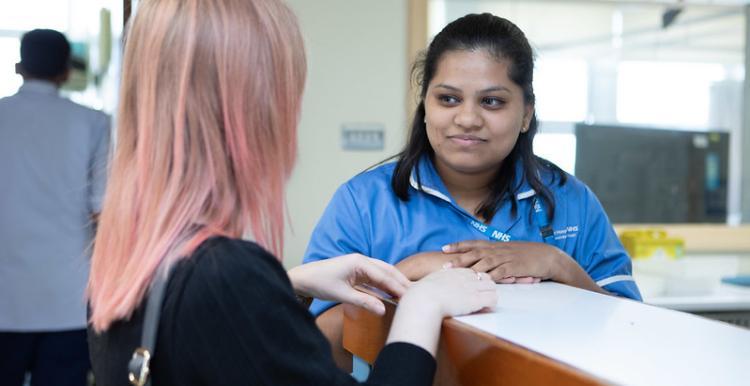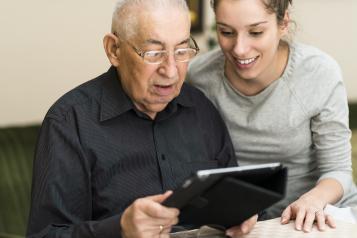NHS support for refugees and people seeking asylum

What are my rights as a refugee or asylum seeker when it comes to healthcare in the UK?
Refugees and people seeking asylum are entitled to NHS care.
If you’ve had your application for asylum granted and have legal refugee status, you have the same rights as any other citizen when it comes to your care. It becomes more complicated if your application for asylum has been refused.
Some types of healthcare are free to everyone, and you can access them regardless of your immigration status. These include GP services, walk-in centres and minor injury services.
What healthcare services are free to everyone?
A General Practitioner (GP) can offer medical advice, provide a diagnosis and prescribe medicines. They might be your first point of contact for many physical and mental health concerns.
GP services are also responsible for coordinating and managing your long-term healthcare and they can refer you if you need more specialised hospital services.
Everyone has the right to register and receive treatment from a GP for free. This means refugees, asylum seekers and refused asylum seekers can get care the same way as any other patient in England.
What if I can't register with a GP?
Learn about your rights and what do to if you are refused the right to register.
You don’t need proof of address, immigration status, ID or an NHS number. If you are having difficulty registering, download an access card and show it to the receptionist at the GP practice.
What if I need urgent care?
If you urgently need medical help or advice but it’s not a life-threatening situation, call NHS 111 if you are living in England. If someone is seriously ill or injured and their life is at risk, call 999 and ask for an ambulance.
Accident and emergency (A&E) services are free for initial treatment regardless of your immigration status. However, if you have to stay in hospital for further care, tests or treatment, you might have to pay.
It’s important you ask the medical professionals treating you before consenting to treatment, and make sure you are clear about costs in advance.
What help can I get from a pharmacy?
Pharmacists can offer clinical advice and medicines for a range of minor illnesses, such as coughs, colds, sore throats, tummy trouble and aches and pains.
The pharmacist will let you know if you need to visit a doctor or direct you to other healthcare professionals to make sure you get the help you need.
You won’t need to pay for advice or signposting, although you can also buy medicines for minor illnesses or first-aid supplies in a pharmacy or supermarket.
What services will I need to pay for?
There are some services that anyone can access regardless of their immigration status, but you’ll need to pay to use them.
For people seeking asylum and refugees, secondary care is free to access.
Secondary care includes hospital treatment, mental health care, hospital urgent care and community services.
There are exemptions to paying for some services. For example, in some cases these could apply to people over 60, those under 19, and those who qualify under the low-income scheme.
You can apply to the low-income scheme regardless of your immigration status. To apply for help with health costs, you can fill out a HC1 form. If you’re eligible, you will then get a HC2 certificate for full or partial help with costs.
If your immigration status means you can’t use public funds and you are getting support from a council, charity or voluntary sector organisation, you’ll need to provide a letter outlining details of any assistance you are getting to see if you qualify for help with medical costs.
- Learn more about which services you need to pay for and which ones are free.
- Find out what might happen if your immigration status changes while you are in the middle of treatment.
- Visit the NHS Business Authority’s website for more information on getting help with health costs.
What happens if I’ve been refused asylum?
If your asylum application has been refused, or you are living in England without immigration permission, you will not necessarily have access to secondary care, and if you do you might need to pay. Find out more about the exemptions that might apply to your case.
Refused asylum seekers can receive some other services for free, including treatment of conditions caused by violence such as torture and domestic violence. You can learn more about this at the links below.
What happens if I’m getting maternity care?
Maternity care is never refused, and must be provided regardless of ability to pay.
However, some people may be charged depending on their immigration status, if they:
- Have been refused asylum
- Are undocumented migrants
- Have no recourse to public funds (NRPF)
- Are in the UK on a short-term visa or are overstayers
There are exemptions for certain groups, such as:
- Recognised refugees and asylum seekers
- Victims of trafficking or modern slavery
- Those receiving support under specific immigration provisions
What if I need more help?
Navigating the the healthcare system can be confusing. If you need support, you can call the Doctors of the World advice line. They also take on case work if you need help with NHS charges, accessing hospital treatment or think you have been wrongly charged.
Here are some other organisations that might be able to help you or provide you with more information:
